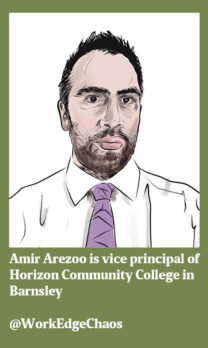@edsacredprofane
A microcosm of wider debate on social media, online educational discourse is rife with binaries: “traditional” versus “progressive”, “inquiry” versus “direct”, “knowledge” versus “skills”. Done in the correct way, this is not actually a bad thing, in that if we use such binaries to challenge “accepted” viewpoints we can move towards a better understanding of effective education. Peter Ford’s blog post on the concept of powerful knowledge does exactly that. He posits the notion that powerful knowledge is a concept that should not be left to theory alone; in fact, even practical subjects have their own powerful knowledge bases. It is an argument that is worth considering in respect to the current notion of a broad and balanced curriculum: “broad and balanced” should not just apply to the subjects that are studied, but also to the mix of theory and practice. Ford, for me, is right in highlighting the danger of being ignorant of powerful practical knowledge, particularly in academic and scholarly subjects such as engineering and architecture.
Lessons that misfire. Good intentions + bad theory = poor results.
@teacherhead
A phrase that I use quite often in relation to observing teaching is the “idea salad”: a lesson that is full of pedagogical ideas but misfires due to the lack of connection to the learning or between the ideas themselves. There is no problem with having a toolkit of different strategies to apply in the classroom in order to make lessons informative and engaging, but trying to use all of the tools at once, and in the wrong way, can be (and usually is) fatal. Tom Sherrington elaborates on this problem, citing examples that make it clear why although in theory the idea of throwing everything at a lesson might be great, in reality it is unhelpful. My favourite quote: “It’s important for teachers to spend time thinking hard about how the activities they plan support the learning intentions.” Where lessons go wrong, often it is because planning gets that order the wrong way around.
@katie_s_ashford
The teacher-student relationship is one of the most important yet least understood concepts in education. Finding the balance between formality and familiarity is an equation that even the most experienced of teachers has to solve when building relationships with classes. Katie Ashford provides a great summary of the best ways to make the most of this crucial dynamic. It should be no surprise that integrity and authenticity are running themes through Ashford’s post, with every element being common sense. Those who have heard second- and third-hand about Michaela Community School (where Ashford is deputy headteacher) may be surprised about her recommendation of a sense of humour, given the boot-camp myth that the school has had to challenge – and which I do not believe to be true. It is not enough to rely on routines and systems to make a lesson function but instead, as Ashford alludes, the real magic comes from the wider qualities that a teacher brings to their game. I really enjoyed reading this blog.
Retrieval practice promotes deductive reasoning
@acethattest
In the crucible of Twitter discourse, you could get the impression that all teachers are using cognitive science to inform their pedagogical practice. In actuality, understanding of notions such as retention and retrieval, working memory and desirable difficulties are rather nascent in the wider educational world. This is understandable, as many teachers are wary of buying into such trends these days (Brain Gym, anyone?). Even as the field grows in appreciation, cognitive scientists continue to find new and wonderful effects of employing strategies such as low-stakes testing, spaced practice and the like. In this post, Cindy Nebel demonstrates how retrieval practice – quizzing, testing, etc – can be employed to have a positive impact on deductive reasoning. In an accessible, clearly structured and informative essay, Nebel challenges the notion that retrieval practice should only be used to improve factual knowledge, arguing that it can be employed to develop skills, too.













Your thoughts